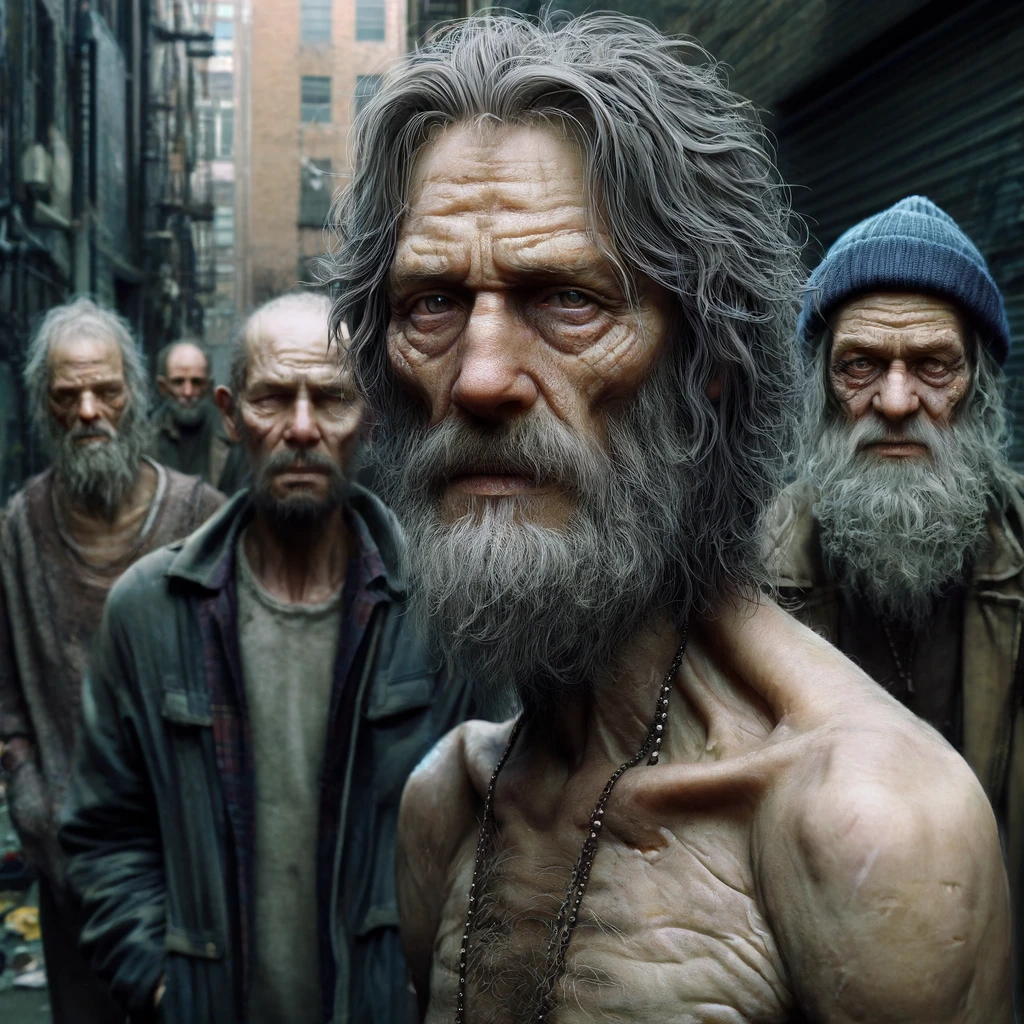In our first part, Human Nature, we pondered the reason that so many human attempts to help others prove so disastrous. If we really strive to do good for others and not just to do things that make us feel good about ourselves, we discover just how complex helping people becomes. Even our most noble feeling actions are plagued with unintended consequences for those we strive to help, and for the rest of their and our societies.
The source of these unintended consequences is rooted in human limitation. Complex systems like economies, ecosystems, cultures, and societies involve too many variables for physically, morally, and intellectually hindered humans to track and anticipate efficiently enough to control outcomes. Our hopes for success are even more dire when we realize that people are selfish & short-sighted, struggle with impulse control, prove apt to take the path of least resistance, and have a penchant for shortcuts, and that these qualities hamper both the helper and the “helped.”
One area that proves disastrous involves the constant human attempt to help the poor, to alleviate the struggles of the “less fortunate.”
This desire usually manifests itself in two veins—Charity & Governmental Wealth Redistribution Programs. Both are fraught with problems when both ignore basic elements of human nature.
People need to be trained into self-sufficiency and made to take personal responsibility for their choices. People need to be free to reap the rewards of wise, intelligent and hard labor, and to endure the natural punishments of foolishness, ignorance and indolence. People need to learn paths of success and to follow those paths with self-sacrificing discipline and care for others. Both charity and government support have a tendency to short-circuit all these processes because they reward and punish the wrong things through pity. They both tend to view those who struggle in destitution as the unwitting victims of dire external forces without recognizing the role that their personal choices play in creating and sustaining unhealthy personal and/or community paradigms.
The danger in charity is realized when the well-meaning rally funds and resources to consistently do for others what they ought to be doing for themselves. Charity hurts those it is intended to help, when, rather than providing emergency assistance education and opportunity for the destitute, it establishes systems that artificially prop up people and communities, and assuages vital pressures that might otherwise provoke a willingness to adopt new processes. When this misguided charity proves bountiful, unhealthy systems of dependency emerge to take advantage of the readily available resources, killing off existing healthy systems that cannot compete with “free.” Orphanages meant to help existing orphans lead to radical increases in child abandonment. Manufacturing and trade industries falter in the face of mass quantities of free good. Indeed, most charitable organizations treat third world populations like infant children who need mother’s perpetual care, and do so without effective plans for nurturing these societies into disciplined, self-sustaining adulthood. To quote the documentary Poverty Inc., “It’s easy to have a heart for the poor, what’s really difficult is to have a mind for the poor.” I highly recommend it, as well as studies like TOXIC CHARITY by Robert Lupton.
As complex as personal charity can become, the more insidious attempts to help the poor emerge from political forces that aim to redistribute the nation’s wealth through the violation of property rights and the forced sharing of wealth through graded taxation and entitlement programs. While one might disagree with such processes on philosophical grounds, the real-world impact of these programs is counter-productive for those it is “intended” to help… it hurts the poor, rather than helping them. (See my article, Entitlement Programs Aren’t Charity or Charitable)
Robbing the rich may make us feel better about ourselves—I’m like Robin Hood!—but it radically hinders the general productivity of society, and ends up limiting the opportunity for the poor to become self-sufficient adults and productive members of society. People are never truly helped by consistently getting something for nothing. Fictions of “free” reward the worst elements of human nature and punish noble efforts. “Free” violates the fundamental law of sowing and reaping, and that violation is bad for individuals and devastating for society in the long run.
People are always vulnerable to jealousy, envy, and resentment against those who prosper more than themselves. Our selfish hearts tell us that the prosperity of one must come at the expense of another—Zero-Sum Economics. Its misinformed adage goes, “No man every became rich, but that another man lost everything.” This fiction proves a benefit to politicians who routinely stoke the fires of mass hysteria over supposed victimization to actuate their own assent into positions of power, but it is not in step with how the real world and how real people work.
Resentment of those who succeed in business is shortsighted. Successful businesses (i.e. the prosperity of “the greedy corporations”) elevates the general well-being of all. One of the most hated men in industry history, John D. Rockefeller, a ruthless businessman, was also one of the greatest philanthropists in history, but his philanthropy was a drop in the bucket of his value for the world. His ingenuity, fueled by the ability to profit, changed the modern world and helped to build a global infrastructure that literally and figuratively paved a path for the elevated prosperity of billions.
The legal pursuit of profit forces people to use available resources efficiently—cheaper & better—and a nation’s efficient use of available resources is a vital element in raising everyone’s quality of life as high as possible at a given time.
The truth is, that a only small percentage of people have proven to have the internal resources for gathering the untapped resources of thousands of others into such organizations of production and service that benefit all. The rest of us depend on them in one form or another. These people, usually tough minded, efficient, leaders with great ingenuity and practical foresight are vital human capital to a society… i.e. they make everyone else better able to succeed.
Even so, people easily get behind political initiatives to control and curtail the prosperity of these wealthy businessmen in the name of “redistributing” the wealth of these “hoarders,” who’ve supposedly gotten ahead by “taking” from the rest of us.
Wealth, however, is not distributed in the first place and it is not hoarded; wealth is created by the industry of some for the general benefit of all. We may not like ruthless businessmen, male or female, but we should be grateful for them and allow them as much freedom as defenders of natural rights can. No one has the right to kill, kidnap, enslave, injure, rob, cheat, or vandalize in order to get ahead, but we harm ourselves when we allow our resentments and envy to back political initiatives to cut down the productivity of our greatest human capital.
Interestingly enough, our efforts against the rich on behalf of the poor are not only misguided in terms of the benefit of the rich for the poor, but are also misguided in terms of the direct impact that our actions have on the hearts, minds and lives of the poor themselves.
Just as the body needs exertion and labor to remain strong, so the soul needs pain, discipline and self-expenditure to remain healthy. As noted above when discussing charity, it is destructive to a person to continually receive without giving. Every member of society needs to participate in the life of the community, doing their part toward the building up and sustaining of the whole. Those who take without giving, when they are able to give, are parasites eating up the prosperous potential of the rest of their community and spreading the social disease of indolence.
The most successful systems reward all its willing participants for cooperative exchange of goods and service, labor and reward. We best get the fullness of all that we need by helping others get some part of what each needs from our efforts. It’s an old saw, because it holds true—”You scratch my back, I’ll scratch yours.”
If, however, we use the weapon of government to take by force from one who has participated in the creation of wealth, to give his or her produce to another who had not equally participated in the production of wealth, we punish the laborer and reward the indolent. It is a basic law of society: You get more of what you reward and less of what you punish. Thus, entitlement programs that punish the producer and reward the indolent, diminish production and increase indolence. Our shortcut to fighting poverty, rather than promoting the prosperity of the poor, hurts and multiplies the poor.
While some poverty is caused by external events (like war, disease, attempted genocide, targeted persecution, natural disasters, etc), the bulk of poverty is the natural result of failed human engagement of circumstances, be they geographical, geological, meteorological, cultural, political, or social. Poverty of circumstances is easily overcome after emergency aid is given; true poverty, however, that which stems from hard-wired processes of continually failing engagement of circumstances is quite difficult to remedy.
In truth, we do not need to discover the causes of poverty, poverty is the natural state of man in a failed relationship to his environment; we need to discover the causes of wealth and prosperity, and to promote those processes as broadly as possible. (May I recommend Thomas Sowell’s WEALTH, POVERTY & POLITICS?)
We should not resent those who succeed, we should emulate them. We should not blame circumstances for our less than desirable conditions, we should blame ourselves for our failure to navigate our circumstances to a better place. For this, we need education, discipline and opportunity. The successful, when emulated, are our greatest resource for each.
I am often amused when people praise the left for their concern for the poor as if the right doesn’t care about the poor. I am amused not only because those on the right are far more generous than the left in the giving of both time and money to the poor—a statistical fact—but also because so many of the processes championed on behalf of the poor by the left are disastrous in their actual effect. The left consistently fail to help those they set their well-meaning sights on because they do not understand the true nature of the problem—human nature—and content themselves with meaning well rather than tracking real-world results.
If you really want to help people, you can’t be shortsighted. You need to understand human nature and how complex human systems work, and you need to track the actual results of your efforts and adjust accordingly, rather than just assuming that anything so well intended must be helpful.
Discover more from Biblical Literacy with Dr. Andrew D. Sargent
Subscribe to get the latest posts sent to your email.



